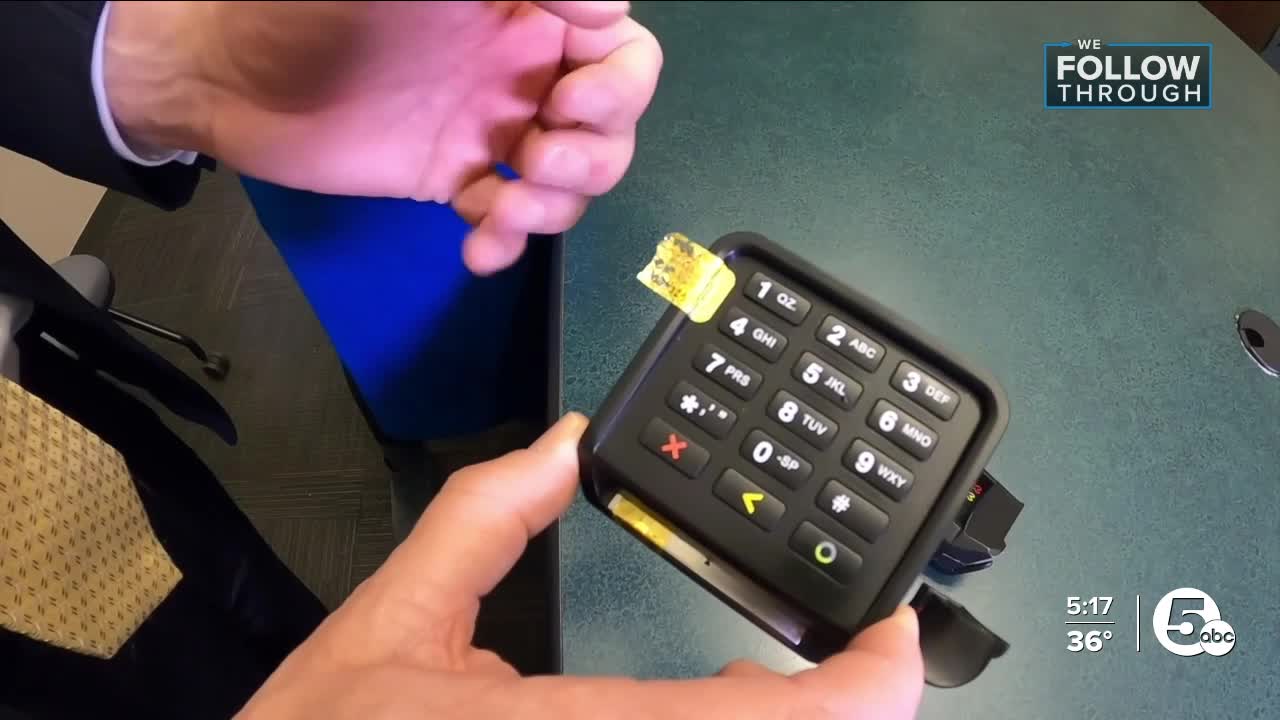CLEVELAND — A group of Ohio lawmakers is trying to stop food-stamp theft by skimming – a crime wave that’s leaving families hungry and costing taxpayers millions of dollars.
A bipartisan bill introduced Friday would require the state to make security upgrades to EBT cards, the cards that food-stamp, or SNAP, recipients use at the store.
Those cards just have old-school magnetic stripes. That makes them particularly vulnerable to fraud. The new legislation would pay for Ohio to roll out cards with embedded security chips – the gold and silver microchips that are already ubiquitous on credit and debit cards.
“We’re getting a lot of buy-in, I think, from a lot of folks that just see this as a pretty simple, straightforward solution that will stop the vast majority of fraud,” said Rep. Tristan Rader, a Lakewood Democrat who is one of the bill’s lead sponsors.
Ohio SNAP recipients have lost at least $17.1 million to criminals over the last two years, according to state data. The Ohio Department of Job and Family Services has been sounding the alarm about card-skimmers, increasingly small devices that thieves put on payment machines at stores to capture EBT card numbers and PINs.
RELATED: Ohio investigator talks about SNAP theft, skimming and how to protect yourself
Criminals use that stolen information to drain people’s accounts, often in a series of rapid-fire transactions in other states.
“It’s disgusting that money’s leaving the state,” said Rader, who used to do food-stamp outreach for the Greater Cleveland Food Bank. “It’s being taken from the poorest people among us, and … it only costs us a fraction of the amount of money that was stolen to actually fix the problem.”
RELATED: 'A failure of government.' As food-stamp theft soars in Lorain, experts say urgent help is needed
His bill, drafted with Republican Rep. Kellie Deeter of Norwalk, would commit $5.3 million to upgrading cards. That’s half of the anticipated cost of adding chips. The other half of the money would come from the U.S. Department of Agriculture.
So far, only a few states are moving from magnetic-stripe cards to chip and tap technology. The federal government hasn’t set a timeline yet for a nationwide transition.
The House bill would give Ohio two years to fully make the switch. The money would only cover chips, not contactless payments.
Rader said the bill, called the Enhanced Cybersecurity for SNAP Act of 2025, has 25 cosponsors so far. He and Deeter are pitching it as an amendment to the state's biennial budget, which the General Assembly has to send to Gov. Mike DeWine by the end of June.
“We know that addressing fraud… is something that is bipartisan,” Rader said.
He’s working on a separate bill, which is likely to be introduced next week, to provide state reimbursement for theft victims. That legislation would commit $17 million over two fiscal years to repayments – filling a void created by the recent end of a federal program.
The federal government made victims whole from mid-2023 through December 2024 – at a cost of more than $220 million, according to data on the USDA’s website. But Congress let that reimbursement program end late last year. An extension didn’t make it into a short-term spending bill that averted a government shutdown.
RELATED: Federal repayment for stolen SNAP benefits is ending. But the problem is getting worse.
Ohio lawmakers are urging Congress to reconsider. A bipartisan group of state senators recently introduced a resolution pushing for the federal reimbursement program to come back. A similar resolution is being drawn up in the Ohio House.
If that doesn’t happen, though, Rader said the state should step up. His state-reimbursement proposal, called the No Hungry Families Act, has support from more than a dozen Democrats – but no Republicans yet.
“This type of fraud… how it has spiked and ramped up, with this boom in computing power and these scammers becoming more sophisticated with these newer technologies— it has become orders of magnitude beyond what we were used to in the past,” Rader said. “Part of the problem is we just haven’t kept up with increasing our security and technology. …And right now, some of the poorest folks in Ohio are being hurt because of it.”




